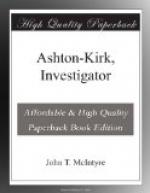“He was there all the time,” said he. “It is not possible that he did not feel the vibrations of the buzzer, for he is very sensitive to such things.”
His indignation appeared to swell him to even greater proportions than before.
“It is an affront,” he stated in a choked tone. “It is a deliberate affront. He felt the buzzer, and he knew it was I. But he did not consider me of enough importance to trouble himself about.”
Panting he sought to turn the small horse, but in a moment Ashton-Kirk was out in the road and had the animal by the head.
“I beg your pardon,” said the investigator, “but it would probably be more beneficial to yourself and others, if you continued your drive and left Professor Locke to us.”
Amazed beyond ability to stir, the doctor sat and stared. But finally he found his tongue.
“Bless my soul and body,” exclaimed he with a great wheezing exhalation. “I scarcely understand this, sir.”
“My dear doctor,” said Ashton-Kirk soothingly, “it is not at all necessary that you do so. The fact is, to state it briefly, there is a trifling matter for adjustment between Professor Locke and the commonwealth.”
“The commonwealth!” cried the doctor, and he shook like a great mass of gelatine.
“Nothing less. So, you see, it will be as well for you to do as I suggest.” Then turning to Pendleton, Ashton-Kirk continued: “I think we had better walk the remainder of the way; otherwise we might get Locke’s attention before it is advisable.”
Pendleton jumped down, and without another word to Dr. Mercer, they set off toward the slate-roofed house by the roadside. However, after they had gone about fifty yards, Pendleton turned and looked back. He saw the small horse jogging away, while behind it, helplessly fat and hopelessly befogged, sat Dr. Mercer, swaying dispiritedly from side to side.
As Ashton-Kirk and Pendleton advanced upon the house, they bore in mind the possibility of Locke being on the watch; so they kept out of sight as much as possible.
“It’s rather odd, I think, that he hangs on here, knowing that his part in the murder of Hume must now be known,” said Pendleton. “I rather expected an attempt at escape.”
“That may come later,” said the investigator, grimly. “The finish of a thing of this sort is always a matter for speculation. I have seen desperate criminals who surrendered like lambs; and I’ve seen the other sort give a platoon of police a good day’s work in their taking.”
“Do you think it possible that Locke is one of this latter type?”
“There is no knowing. But I am inclined to believe that he is.”
Pendleton shook his head. It seemed impossible that this dapper little man with his peering, short-sighted eyes could be capable of any determined effort to escape the police when once driven into a corner. However, Pendleton had ample reason to respect Ashton-Kirk’s judgment; and so when the latter deemed it necessary to approach with caution, he acted accordingly.




